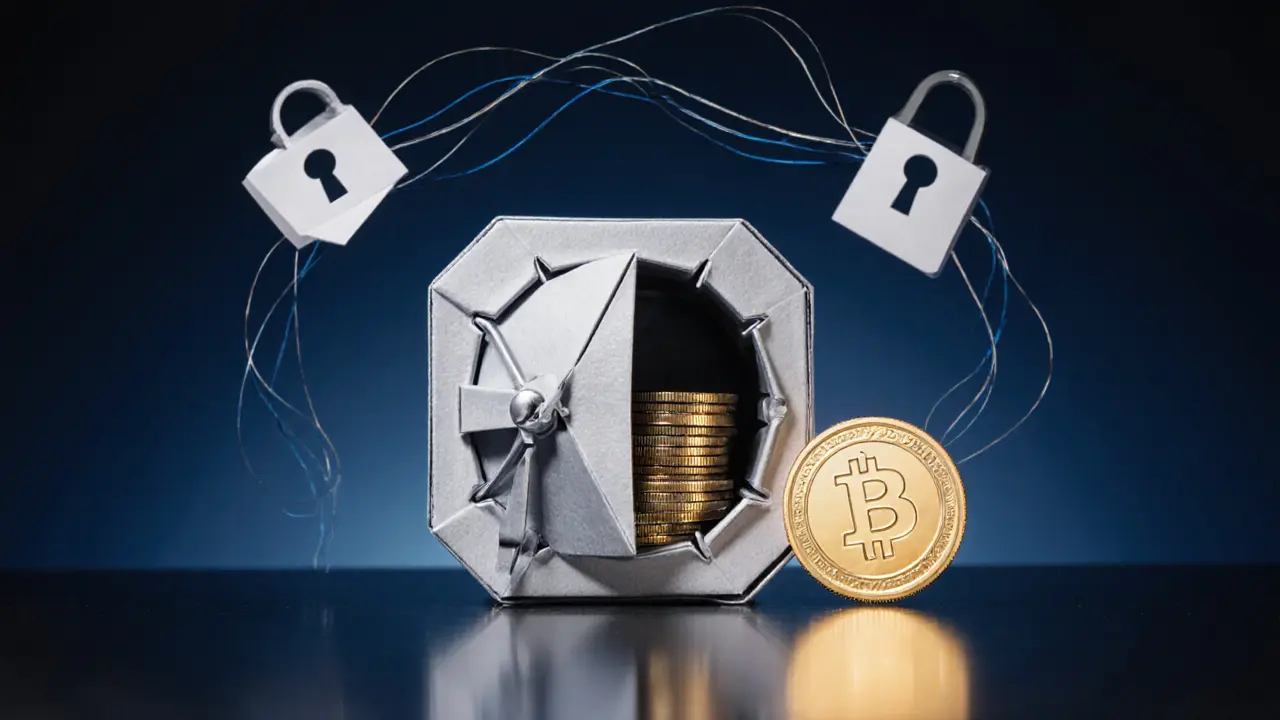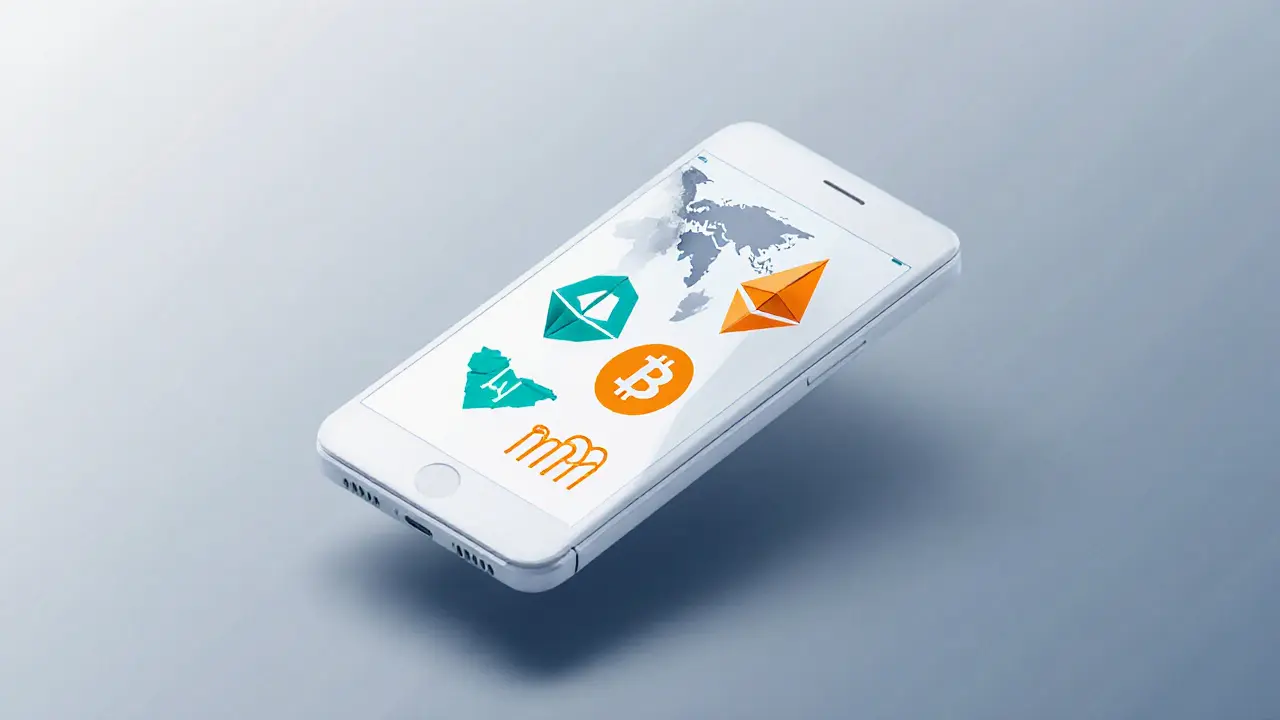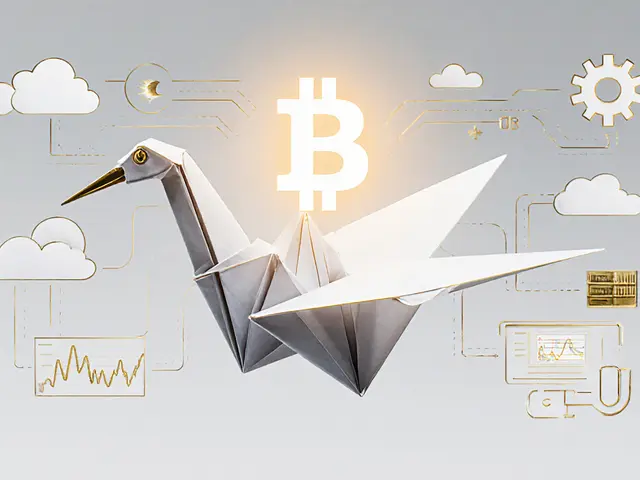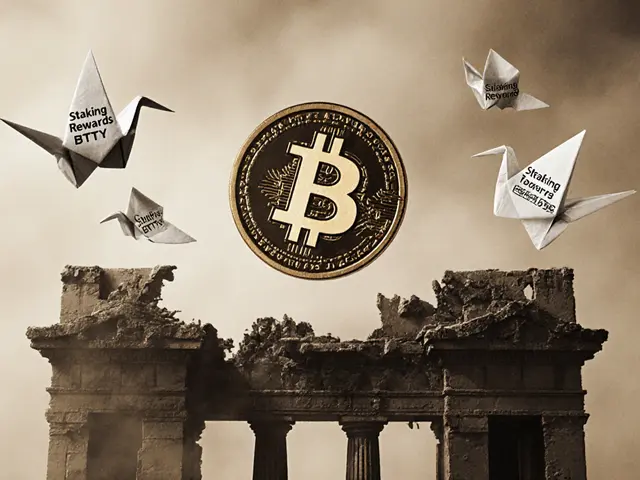Bitpin Fee Calculator
Estimated Trading Costs
Trade Amount:
Asset:
Trade Type:
Estimated Fee:
Fee Percentage:
Breakdown:
Bitpin is a Iranian cryptocurrency exchange launched in 2020 that targets the Middle Eastern market with local fiat integration. If you’re wondering whether it lives up to the hype, this review breaks down the platform’s core features, security stack, fee transparency, and mobile experience as of October2025.
Key Takeaways
- Strong local focus-supports Toman and USDT for seamless IRR‑crypto conversion.
- Security relies on cold storage and mandatory two‑factor authentication (2FA).
- Mobile app boasts 100k+ downloads, a 3.9‑star rating, and real‑time price feeds.
- Fee schedule is opaque; users should expect higher costs than most global exchanges.
- Missing advanced tools like derivatives, API access, and deep order‑type libraries.
What Bitpin Actually Offers
The platform provides spot trading for a handful of major blockchains: Bitcoin (including the Lightning Network), Ethereum, Binance Smart Chain, and TRON. Users can deposit and withdraw both crypto and the Iranian fiat unit, the Toman, alongside the stablecoin USDT. This dual‑currency model lets traders convert small “dust” balances without hassle, a feature many larger exchanges overlook.
Security - How Bitpin Defends Your Assets
Bitpin’s security narrative hinges on two pillars:
- Cold storage - the majority of user crypto sits offline, insulated from internet‑facing attacks.
- Two‑factor authentication (2FA) - mandatory during login and withdrawal, adding a second secret beyond the password.
The team markets the platform as “unhackable,” but that claim holds only if users follow basic hygiene: strong, unique passwords, updated authenticator apps, and vigilance against phishing. No public breach reports exist to date, suggesting the technical safeguards are holding up.
Mobile Experience - Android App Deep Dive
Bitpin’s Android client, available on Google Play, has crossed the 100,000‑download mark and maintains a 3.9‑star rating from over 1,700 reviewers (June2025 data). The app’s UI is intentionally minimalist: a dashboard shows real‑time price ticks, a wallet screen lists holdings in BTC, ETH, BNB, TRX, and USDT, and a single‑tap “Gift Card” button lets users create fee‑free crypto vouchers.
Key app features include:
- Instant price updates refreshed every second.
- Integrated market analysis tools (candlestick charts, volume heatmaps).
- Push notifications for order execution and price alerts.
- Secure login via 2FA and biometric fingerprint support.
Regular updates - the latest on June92025 - indicate an active development team that patches bugs and refines the UI.
Customer Support - Availability and Channels
Bitpin claims 24/7 support, even on official Iranian holidays. Users can reach the team via in‑app chat, phone, or in‑person consultations at Bitpin’s Tehran office. Reviewers frequently praise quick response times and a willingness to walk users through transactions, especially when navigating Toman‑crypto conversion steps.
Fee Structure - The Missing Piece
Unlike global peers (Binance, Kraken, Coinbase) that publish detailed tiered fee tables, Bitpin does not disclose a complete schedule on its website or app. Community chatter suggests a flat‑rate model, likely higher than the 0.1‑0.2% typical on major exchanges. The lack of transparency makes cost‑of‑trading calculations difficult, especially for high‑volume traders who rely on fee discounts from native tokens on platforms like Binance.
Potential hidden costs include:
- Withdrawal fees for fiat (Toman) transfers.
- Spread markup on low‑liquidity pairs such as TRX/USDT.
- Possible premium for instant “dust‑to‑cash” conversions.
Prospective users should test a small trade first to gauge actual fees before committing larger capital.

How Bitpin Stacks Up Against Global Exchanges
| Feature | Bitpin | Binance | Coinbase | Kraken |
|---|---|---|---|---|
| Regional focus | Iran & Middle East | Global | Global | Global |
| Supported fiat | Toman, USDT | USD, EUR, many others | USD, EUR, GBP | USD, EUR, CAD |
| Spot markets | BTC, ETH, BNB, TRX, USDT | 300+ coins | 250+ coins | 200+ coins |
| Derivatives | No | Futures, options | No | Futures |
| API access | Limited (no public docs) | Full REST & WebSocket | REST | REST & WebSocket |
| Fee transparency | Unclear | Published tiered schedule | Published schedule | Published schedule |
| Mobile app rating (Android) | 3.9 ★ (1,700+ reviews) | 4.5 ★ | 4.4 ★ | 4.3 ★ |
The table makes it clear: Bitpin excels at local fiat integration and reliable availability, but it lags in product depth, global liquidity, and fee clarity. Traders focused on Iranian markets will find the Toman bridge invaluable, while seasoned global traders may miss advanced order types and API support.
Regulatory Landscape - Why Bitpin Exists
Iran’s financial system faces heavy international sanctions, prompting many citizens to turn to crypto as an alternative store of value. Bitpin operates under Iranian cryptocurrency regulations, which differ markedly from the KYC/AML regimes governing platforms like Coinbase or Kraken. The exchange’s ability to keep buying and selling functions continuously active - a point highlighted by local reviewers - stems from its alignment with domestic policy, something global players cannot guarantee in Iran.
That regulatory niche also means limited cross‑border withdrawal options. Users looking to move crypto out of Iran may encounter additional hurdles, especially if they need to convert to non‑stable fiat currencies.
Pros and Cons - Quick Verdict
| Pros | Cons |
|---|---|
| Native Toman support simplifies local trading. | Fee schedule is not publicly disclosed. |
| Cold storage and mandatory 2FA improve security. | Limited to spot trading; no derivatives. |
| Active Android app with real‑time price feed. | No public API for algorithmic traders. |
| 24/7 customer support available in Persian. | Liquidity may be lower than global exchanges. |
| Dust‑to‑cash conversion feature reduces balance waste. | Geographically restricted - not usable from many countries. |
Who Should Consider Bitpin?
- Iranian residents who need a straightforward way to convert Toman into crypto.
- New traders who value a simple UI and live support in Persian.
- Users who prioritize local regulatory compliance over global product depth.
Conversely, professional traders, developers seeking API access, or anyone needing advanced derivatives should look to larger exchanges.
How to Get Started on Bitpin
- Download the Android app from Google Play or visit the official website.
- Create an account using a valid Iranian mobile number.
- Complete KYC - upload national ID and a selfie for verification.
- Enable 2FA via Google Authenticator or SMS.
- Deposit Toman through a supported bank transfer or add USDT via a compatible wallet.
- Navigate to the Spot market, choose a pair (e.g., BTC/Toman), and place a market or limit order.
- Monitor your position from the dashboard; withdraw to your personal wallet when ready.
Test the platform with a small amount first to confirm withdrawal fees and transaction speed.
Future Outlook - Will Bitpin Keep Up?
Crypto adoption in Iran is still on the rise, driven by sanctions and inflation. Bitpin’s focus on local fiat integration gives it a defensible moat, but the exchange must address two glaring gaps to stay competitive: transparent fee disclosures and expanded product offerings (e.g., API, futures). If the team rolls out these features while maintaining security, Bitpin could become the go‑to hub for Iranian institutional players as well.
Frequently Asked Questions
Is Bitpin safe for storing large amounts of crypto?
Bitpin stores the bulk of user funds in cold storage and enforces 2FA. While no platform is 100% hack‑proof, the combination of offline wallets and mandatory two‑step login makes it one of the safer options in the Iranian market. Users should still keep large holdings in personal hardware wallets for added protection.
Can I trade Bitcoin futures on Bitpin?
No. Bitpin currently offers only spot trading for a limited set of assets. If futures or options are essential, you’ll need a different exchange.
What are the typical fees for buying crypto with Toman?
Bitpin does not publish a detailed fee table. Community reports suggest a flat spread of 0.5‑1% on Toman‑crypto purchases, plus a small withdrawal fee. Test a minimal trade to see the exact cost.
Is there an API for automated trading?
Public API documentation is not available on Bitpin’s site, meaning algorithmic trading is currently unsupported.
How responsive is Bitpin’s customer support?
Support is 24/7 via chat, phone, and in‑person visits in Tehran. Users often cite quick turnaround times and helpful Persian‑language agents.





WILMAR MURIEL
Reading through the Bitpin review, I couldn't help but feel a wave of empathy for anyone navigating the labyrinth of crypto exchanges these days.
First, the fee calculator-while a noble attempt-still leaves a lot to be desired, especially when the percentages are vague and the tiered structure feels like a hidden maze.
Security-wise, Bitpin touts two-factor authentication and cold storage, which is reassuring, but the lack of a transparent audit trail makes me wonder how many users truly trust the platform.
From a user‑experience angle, the mobile app’s UI is sleek, yet it occasionally stutters during peak trading hours, suggesting that the backend infrastructure might be overtaxed.
Another point that struck me is the limited fiat on‑ramp options; most users in the region rely heavily on local banks, and Bitpin’s integration there is still shaky.
When it comes to customer support, the response times are decent, but the scripts sound generic, lacking the personal touch that seasoned traders often appreciate.
Moreover, the absence of clear KYC documentation can be a barrier for newcomers who are just trying to dip their toes in the crypto waters.
One cannot ignore the fact that the fee percentages vary not only by volume but also by asset type, making the cost calculation a moving target.
In the grand scheme, Bitpin seems to be positioning itself as a middle‑ground platform-neither fully DIY like Binance nor as regulated as Coinbase.
For traders who value a balance between accessibility and security, Bitpin might be a stepping stone, but it’s crucial to keep an eye on hidden costs.
The community's feedback, as cited in the review, suggests a cautious optimism but also a call for greater transparency.
Looking ahead, I hope Bitpin will release more detailed audit reports and perhaps a clearer fee schedule on their website.
Until then, I would advise anyone considering Bitpin to start with a modest amount, test the waters, and keep meticulous records of each trade.
Remember, the crypto realm rewards patience and diligence, and platforms like Bitpin thrive when users are both informed and vigilant.
Ultimately, the decision rests on your personal risk tolerance and how much you value a seamless mobile experience versus absolute fee clarity.
carol williams
As a seasoned analyst in the fintech space, I can attest that Bitpin's architecture exhibits both commendable features and glaring omissions.
The platform’s integration of cold storage is a standard industry practice, yet the public does not have access to a granular security audit, which is a non‑negotiable expectation these days.
On the fee front, the tiered model superficially resembles that of established exchanges, but the lack of explicit percentages for each tier creates unnecessary ambiguity.
Moreover, the mobile app, while aesthetically pleasing, suffers from occasional latency spikes, indicating potential bottlenecks in server allocation.
Regulatory compliance is another area where Bitpin appears to be playing catch‑up; the KYC procedures are not as rigorous as those mandated by financial authorities in major jurisdictions.
In sum, while Bitpin presents a viable option for casual traders, it falls short of the transparency and robustness demanded by professional investors.
jit salcedo
Ever wonder why every "transparent" exchange suddenly drops a vague fee table right after you enter your payment details?
Bitpin is no different; they hide the real costs behind a glossy calculator that merely reflects community whispers.
Some say the hidden 0.2% spread on low‑volume trades is a secret tax designed to siphon funds into undisclosed wallets.
Their security claims sound like a lullaby-two‑factor authentication and cold storage, yet no one has seen a third‑party audit confirming these safeguards.
And let’s not ignore the mobile app glitches that appear precisely when you’re about to make a large trade, as if the system is intentionally preventing big moves.
All this suggests that Bitpin may be part of a larger, covert network aiming to control regional crypto flow while keeping users in the dark.
Lisa Strauss
Hey folks, just wanted to add a quick positive spin here.
Even with the fee opacity, many users have reported that Bitpin’s interface is beginner‑friendly and the app feels smooth after the initial updates.
It’s definitely a solid stepping stone for those just starting out in crypto.
Latoya Jackman
The fee structure lacks transparency.
Megan King
Yo, I tried Bitpin's app last night and gotta say, the UI is pretty chill, kinda like a slick Instagram feed for crypto.
It loads fast most of the time, but when the market spikes, you might see a lil lag-nothing crazy though.
Fees? They’re not exactly spelled out, kinda like a mystery box, but people say they’re average compared to other platforms.
Security feels solid-2FA works and they say they keep most coins offline, which is cool.
If you’re just dipping your toes, give it a whirl, just keep an eye on the fine print.
Rahul Dixit
Listen, as an Indian trader I can say that Bitpin's lack of clear INR fee breakdown is a major red flag.
If they want to attract the massive Indian user base, they need to be upfront about charges; otherwise, it's just another profit‑draining scheme.
Krystine Kruchten
From a mentorship perspective, Bitpin does offer some valuable educational resources, albeit scattered across their blog.
The mobile application, while not perfect, provides a seamless onboarding flow that can help newcomers grasp the basics of buying, selling, and staking crypto assets.
Nevertheless, the opacity surrounding fee structures could be mitigated by providing a detailed breakdown per transaction type, which would greatly enhance user trust.
Security measures such as two‑factor authentication and encrypted cold storage are industry‑standard, yet I recommend that users enable all available safeguards, including withdrawal whitelist addresses.
Overall, the platform has potential, but it must prioritize transparency to foster a loyal user community.
Mangal Chauhan
🧐 Thanks for the thorough take! 🚀
I'd like to add that the app’s API responsiveness has improved after the latest update, which is a big win for algorithmic traders.
Additionally, the platform now supports hardware wallet withdrawals, a feature that aligns with best‑practice security protocols.
Keep an eye on the fee tier tables-they’ve been adjusted slightly, but the details are still tucked deep within the FAQ.
Overall, Bitpin seems to be evolving, albeit at a measured pace.
Iva Djukić
Delving into Bitpin's operational paradigm reveals a confluence of both conventional and emerging fintech methodologies.
The platform's fee architecture, albeit ostensibly tiered, suffers from a paucity of granular disclosure, impeding comprehensive cost‑benefit analyses for institutional actors.
From a security infrastructure standpoint, the deployment of multi‑signature custodial wallets aligns with contemporary best practices, yet the absence of publicly audited cryptographic attestations introduces an element of epistemic uncertainty.
Mobile application ergonomics have been optimized for low‑latency transaction execution, though occasional synchronization lags during high‑volume market fluxes suggest suboptimal load‑balancing mechanisms.
Regulatory compliance is partially addressed via KYC/AML protocols, but the documentation lacks the granularity mandated by cross‑border jurisdictional frameworks.
In sum, Bitpin occupies an intermediary niche, offering accessibility while grappling with the imperatives of transparency and scalability.
Darius Needham
Interesting analysis! Could you clarify how the multi‑signature setup compares to single‑key custody in terms of recovery procedures?
karsten wall
Bitpin's community forums have become a decent knowledge hub, especially for newbies looking to understand fee nuances.
The platform’s approach to integrating local fiat gateways is commendable, though it could benefit from tighter AML oversight.
Overall, a respectable contender in the regional exchange landscape.
C Brown
Oh sure, because a semi‑transparent fee schedule is exactly what we all dreamed of when we signed up for crypto.
Maybe next they’ll announce “mystery penalties” to keep us on our toes.
Adeoye Emmanuel
I'm fascinated by how Bitpin's algorithmic pricing engine allegedly adjusts spreads dynamically, yet the documentation remains vague.
Understanding this could be crucial for traders aiming to optimize slippage.
Deepak Chauhan
Indeed, the dynamic spread mechanism is a double‑edged sword – it can protect users during volatility but also obscure true market pricing. 😊
Aman Wasade
Looks like another exchange trying too hard.
Ron Hunsberger
For anyone considering Bitpin, here are a few practical tips:
1. Start with a small test transaction to gauge fee calculations.
2. Enable both SMS and authenticator app 2FA for maximum security.
3. Regularly export your trade history to maintain personal records, as Bitpin's reporting tools are limited.
4. Monitor the FAQ page for updates on fee tiers, especially after major market events.
5. If you plan to hold large sums, consider moving a portion to a personal hardware wallet for added safety.